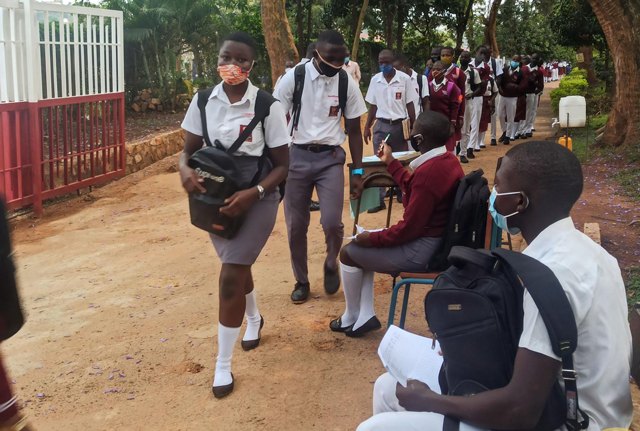
Kampala, Uganda | THE INDEPENDENT | In the wake of the Ebola virus disease outbreak in Uganda, the Ministry of Education and Sports has instructed schools to reactivate the strategies used during COVID-19 pandemic to keep learners and staff safe.
While meeting journalists at Nakasero State Lodge on Friday evening, the Education Minister Janet Kataha Museveni said that it was critical to guide schools on handling the Ebola outbreak, which has begun to scare parents, teachers, and students alike.
According to the minister, in addition to reviving task forces that were established to fight COVID-19, all SOPs that were issued once schools fully reopened following the two-year school closure should be emphasized in order to successfully stop the spread of Ebola in learning institutions.
The new guidelines to schools come at a time when some learning institutions located in the epicentre districts of greater Mubende had closed doors to their learners as a means of stopping the spread of the feared Ebola that broke out in the area over two weeks ago.
Media reports also indicate that in schools which had not closed, some parents have been voluntarily ordering their children not to go to school despite government assurances that public gatherings and travel are not restricted in regions where there have been confirmed cases of Ebola.
However, Janet reassured parents that Ebola can be controlled as long as the schools follow the prescribed standard operating procedures and educate students on how to prevent the disease.
With the Ministry of Education reactivating the January 2022 Covid-19 guidelines, this means that schools must place a lot of emphasis on handwashing, measuring students and staff body temperatures, wearing face masks, cleaning surfaces, and social distancing in addition to ceasing all activities that might involve students and staff coming into contact with each other physically while in the classroom.
“We already have structures in place from COVID-19, the school task forces should be reactivated and enhanced,” said Janet. “We should prohibit community people from entering our institutions, especially boarding schools, and teachers ought to disseminate information about Ebola as we did with COVID-19.”
She said that schools should prioritise disinfecting surfaces like tables and blackboards. “According to medical professionals, the Ebola virus can survive on surfaces for 5 to 10 days. We should make sure to wipe these tables in our classrooms. If you don’t have any alcohol-based hand sanitizers, you can use JIK or regular bar soap.”
During the Covid-19 crisis, public schools were given a special fund to set up the necessary infrastructure and purchase necessities like soap and sanitizer. However, the ministry says this time around they should not expect such funding but should rather plan based on their available finances.
As ministry tells schools to re-activate Covid-19 protocols, there is doubt that some of these operating procedures might not be enforced. For instance, rules on social distance demonstrated that they were ineffective due to factors like large learner-classroom ratios among other factors.
However, State Minister for Higher Education John Chrysostom Muyingo points out that regardless of the circumstances, schools must take the necessary precautions to protect students. “Our classrooms are packed, and that might be a major problem,” he said. “Regarding some of these issues, teachers must be accommodating. For instance, if the weather permits, they can teach outside.”
*****
URN
 The Independent Uganda: You get the Truth we Pay the Price
The Independent Uganda: You get the Truth we Pay the Price






The students should follow SOPs.
Let the students and the citizens of the nation Uganda act positively with each and every guideline put across by the fighting task force